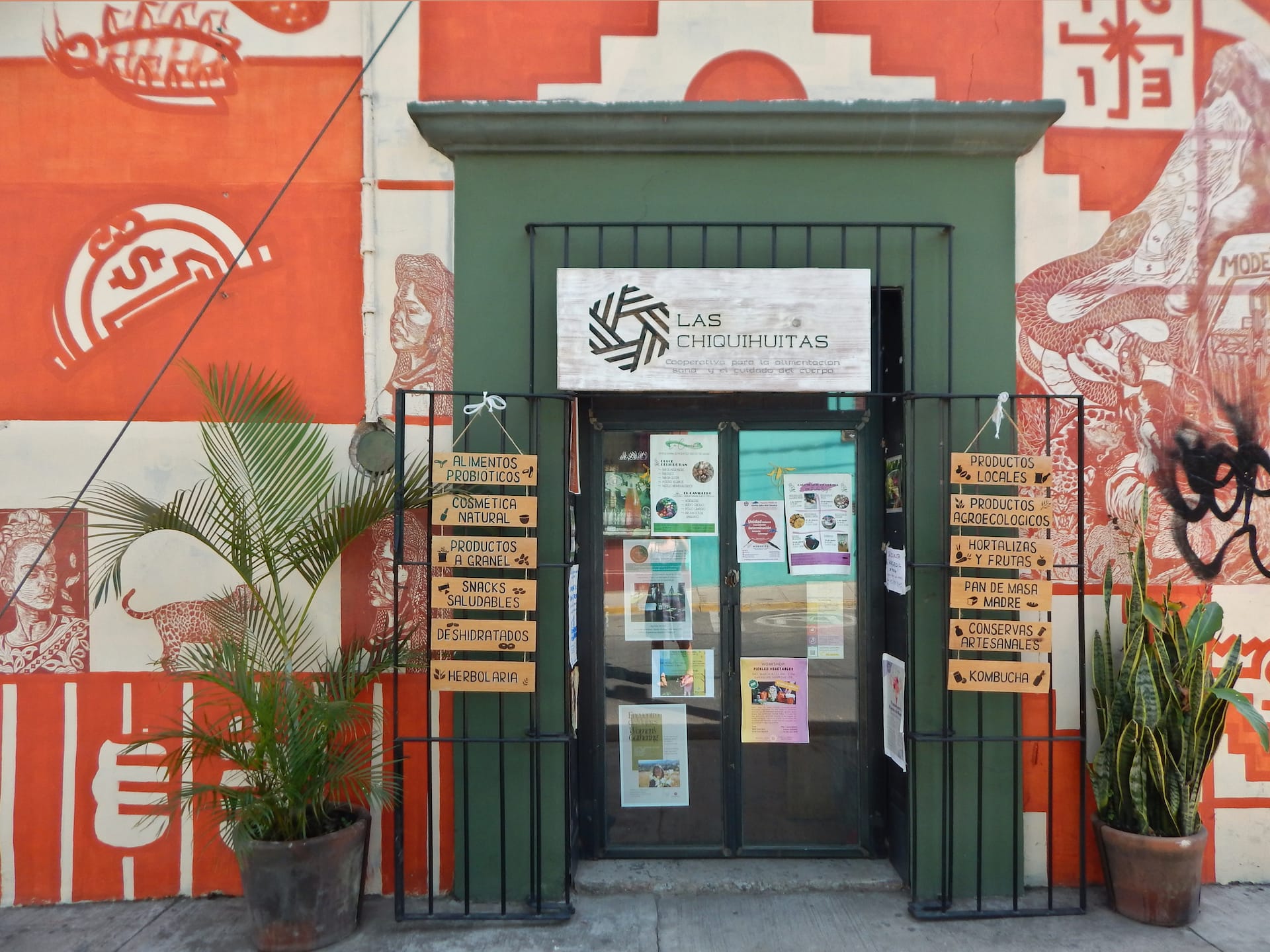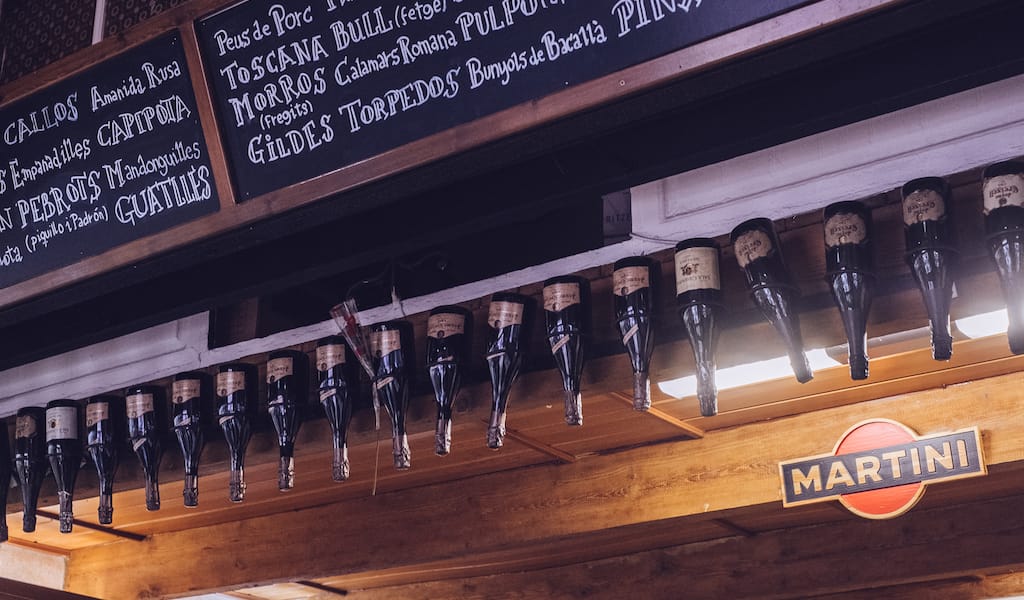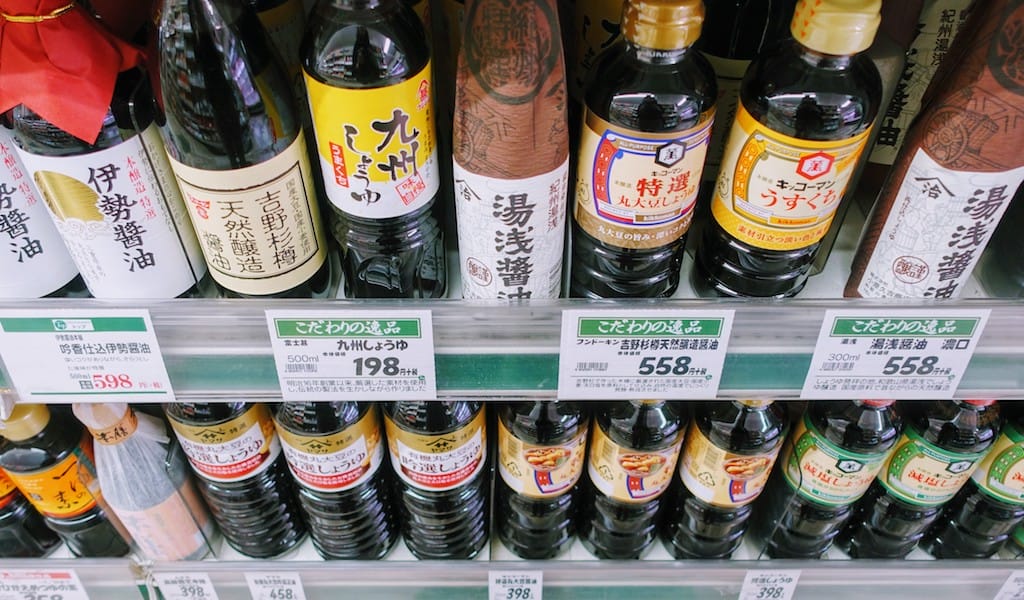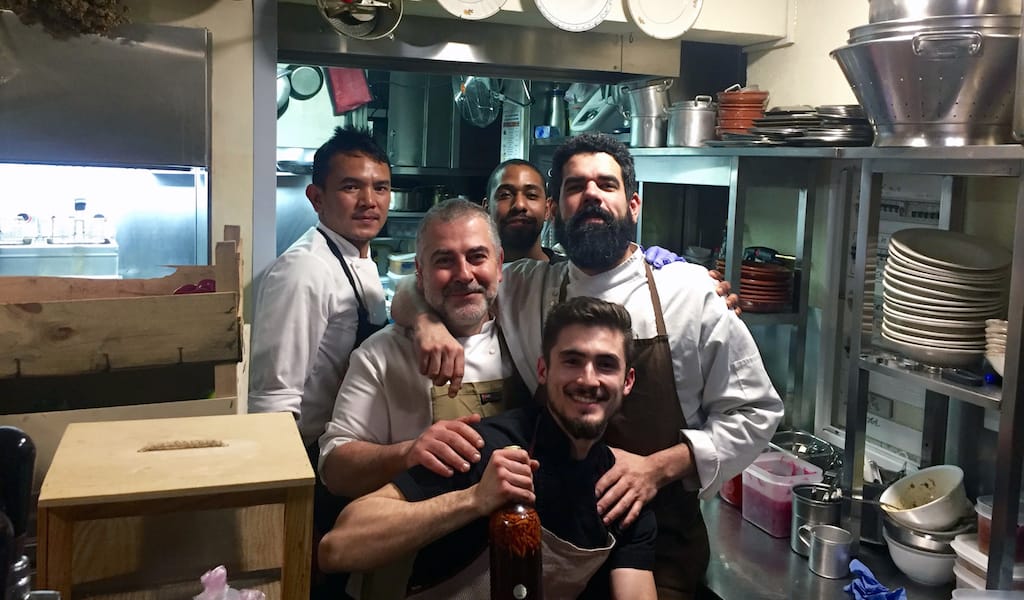Las Chiquihuitas is a relative newcomer to Oaxaca’s organics scene that celebrates its two-year anniversary this month. A tiny sliver of a corner store located right smack-dab in the city’s historic center, the shop manages to pack a surprising amount of organic, local and lovingly produced foods within the diminutive confines of its four walls.
A quick examination of Chiquihuitas’s lone refrigerator turns up a candy-colored array of seasonally flavored kombuchas and ginger beers stacked above a selection of buffalo milk butter and cheeses sourced from the Oaxacan coast, plus chunky glass jars of ferments ranging from classic sauerkraut to spicy kimchi. The store’s selection of dry goods might include shiny black beans, sticky, dark-brown blocks of the unprocessed sugar known as panela and jugs of fragrant virgin coconut oil. Happily, there’s a robust lineup of fresh produce, too, with juicy tomatoes, spiky pineapples and nubby potatoes peeking out of the black plastic crates dominating one of the store’s shelving units.
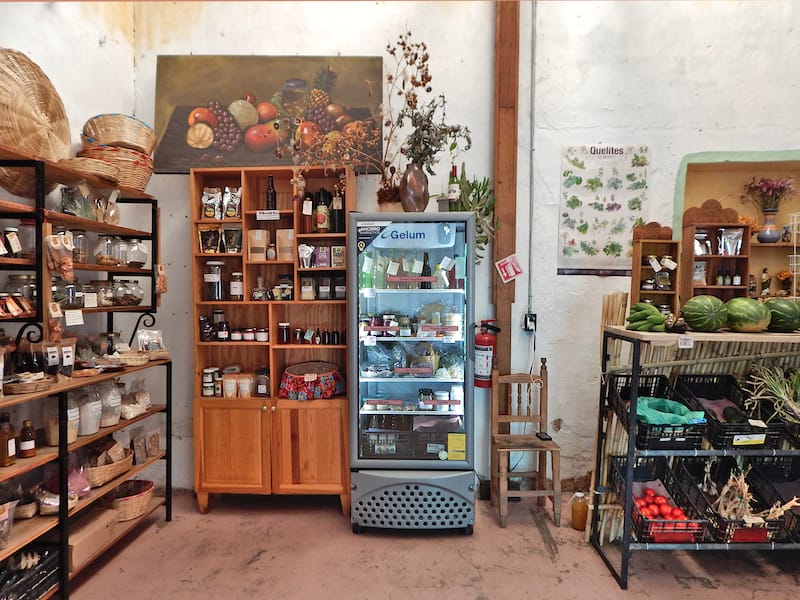
Las Chiquihuitas’ thoughtfully curated, varied selection of organic ingredients and products makes the store unique among Oaxaca’s offerings, as does its business model. Rather than the traditional type of store whose owner or manager orders items from a variety of producers and brands, Chiquihuitas is a collective that’s run democratically by a team of seven women, each of them with their own businesses, who stock the store with their own items and collectively pay rent as well as the store clerks’ salaries. They are Laura Alejandra Ojeda Real, Miriam Jiménez Sosa, Farina Pakulat, Victoria Alejandra Aguilero Velasco, Esperanza Martinez Chavez, Mariana Rodriguez Todd and Yohaira Muñoz.
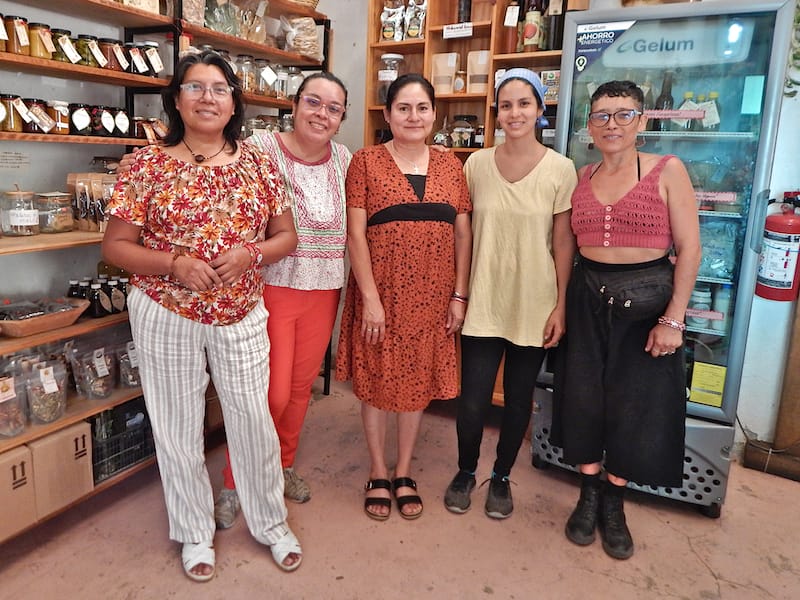
Like many young businesses, Las Chiquihuitas was the result of improvisation during the Covid-19 pandemic, Ojeda, one of the store’s founding members, tells us as we hide out inside the air-conditioned interior on a recent sweltering afternoon. A former food scientist specializing in the biochemistry of plants, Ojeda, 45, spent 15 years visiting agricultural communities in Oaxaca – those utilizing “conventional,” or non-organic, methods. Witnessing farmers’ heavy usage of toxic chemical pesticides, herbicides, fungicides and fertilizers, she says she had to “confront the fact that conventional agriculture extracts from the land, without giving back to it.” Ojeda’s interest in organic, sustainably raised and harvested crops grew. And by the time the pandemic restrictions were firmly in place in Oaxaca, in the spring of 2020, she was in touch with a small group of organic producers located near her home in Etla, a rural area located about 45 minutes northwest of the city. When the town closed to outside visitors and commerce, Ojeda recalls, these producers banded together to provide fruits, vegetables and other crops to locals, as well as to get fresh food to residents of Oaxaca City.
Thus, Ojeda’s project, the Red de Consumo Responsable (“Network of Responsible Consumption”) was born. With Ojeda as the link between shoppers interested in fresh, local, organic produce and the growers themselves, the Red took form as a tiny initiative whose goal was to maintain the growers’ market throughout the difficult years of the pandemic, as well as to keep lovers of healthy food well supplied.
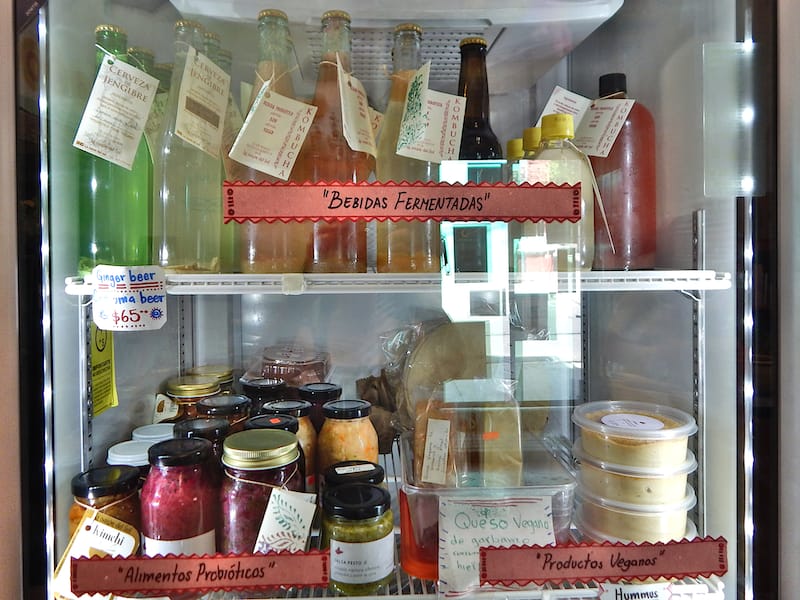
At the same time, and not far away, two other Etla residents, Katja Von Helldorff, a revered sourdough baker originally from Belgium, and Miriam Jiménez Sosa, a farmer beloved especially for her Roma tomatoes, had teamed up on a project called La Canasta (“the basket”). In a group on the messaging app WhatsApp – where lots of commerce takes place in Mexico – the pair offered their subscribers a range of Von Helldorff’s breads and pastries, and Jiménez’s tomatoes, greens, eggs and free-range chicken, to be delivered both in Etla and Oaxaca City, with the shared goal of maintaining robust circulation of organic foods during the pandemic lockdowns.
As its delivery point in Centro, La Canasta utilized an events space called Matamoros 404, another pandemic baby. A giant, historic home that had been abandoned for decades, the property was slowly rehabilitated by its heir, Natalia Carrasco Vargas, and inaugurated in February 2021. One day, in May of 2022, Carrasco mentioned to Von Helldorff that Matamoros 404 had decided to offer one of its spaces to rent to a commercial project, and she thought that La Canasta might be a good fit.
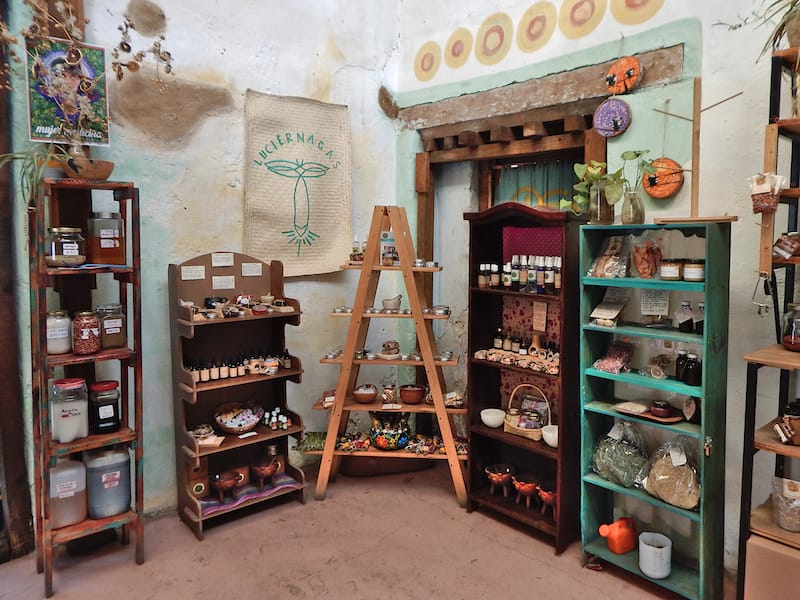
In a throw-caution-to-the-wind series of meetings that Ojeda referred to as “Mexican-style planning,” she, Von Helldorff and Jiménez – who, being neighbors involved in similar projects, knew each other – discussed moving into the space as partners and running it as a collective. They also called in an acquaintance, Farina Pakulat, whose project Ma’Tierra was yet another ordering service linking Oaxacan customers with local, organic food. To bring costs down even more, the group decided to invite Esperanza Martínez Chavez, a maker of herbal remedies, soaps and lotions, as well as a French cheesemaker who has since left the project.
By June 2022, the group of seven founding members had moved into the space, a tiny, tiled-floor storefront that “didn’t even have any furniture” on opening day, as Ojeda recalls. The group decided on the name “Las Chiquihuitas” as a play on words: a chiquihuite is a woven fiber basket typically used to transport and display goods, but adding the feminine “a” ending to the word illustrates the feminine force behind the store. From the beginning, Ojeda explains, the store set out to distinguish itself from other organic stores and markets in Oaxaca. For one thing, there’s much more transparency. Within her Red de Consumo, which has grown substantially over the years, Ojeda personally visits each producer to ensure they are adhering to organic, sustainable practices, abstaining from the use of toxic chemicals and rehabilitating their soil through regenerative agricultural methods. As partners have come and gone over the past two years, new ones, such as Victoria Alejandra Aguilero Velasco – whose project Sazón del Sol harnesses the power of the sun to create sun-dried and sun-baked vegetables, instant soup mixes, energy balls and desserts – must also prove that they are producing organic food.
Secondly, Ojeda stresses that the store strives to produce as little waste as possible. “We’re interested in taking care of the environment,” she says. “That means we avoid using plastic packaging as much as possible. Necessarily, that limits the scope of the products we can offer, but it’s very important to us.” Additionally, in order to keep prices down in the store, the partners have a shared goal of keeping operating costs as low as possible, dividing administrative and maintenance tasks among themselves and paying the store’s clerks for the more straightforward work of attending customers.
“It’s really very special, because we all have different ways of seeing things, and we’re different people, but there’s so much respect, communication and understanding between us,”
Currently, Chiquihuitas’ lineup consists of the Red de Consumo’s products, which are delivered every Friday afternoon along with those from Ma’Tierra; farmer Jiménez’s produce, eggs and chicken; Aguilero’s diverse sun-baked ingredients and treats; and Martínez’s herbal cosmetics. Newcomers Mariana Rodriguez Todd and Yohaira Muñoz bring their goods from the town of Mazunte on the Oaxacan coast: Rodriguez’s raw vegan desserts, and Muñoz’s line of nut butters, tahini, salsas and other condiments. While she is no longer a partner, the store also continues to stock Von Helldorff’s superb organic sourdough breads and pastries.
Through its two years of growth, Las Chiquihuitas has become a favored destination for those seeking high-quality organic products. “When you say the name ‘Chiquihuitas,’ people go, ‘ah, right,’ – there’s recognition there,” Ojeda notes. “That feels really gratifying.” But above and beyond offering fresh, local products to consumers, the store’s business model works well for its partners, too, offering a centrally located brick-and-mortar home for their products without any one partner having to shoulder the ever-increasing Oaxaca City rents alone.
For Aguilero of Sazón del Sol, 40, integrating into Las Chiquihuitas last April was like a sigh of relief after having rented a storefront on her own from 2020-2022. With her brand well-established (and well-loved), having gotten started in 2012, Aguilero’s store was not wanting for customers and she didn’t have any issues paying rent, but what she did suffer from was a reduced quality of life, she recalls. “We had more than 200 products in the store, and it was just so much work. Being in charge of everything required a lot of energy, and I felt a lot of stress.”
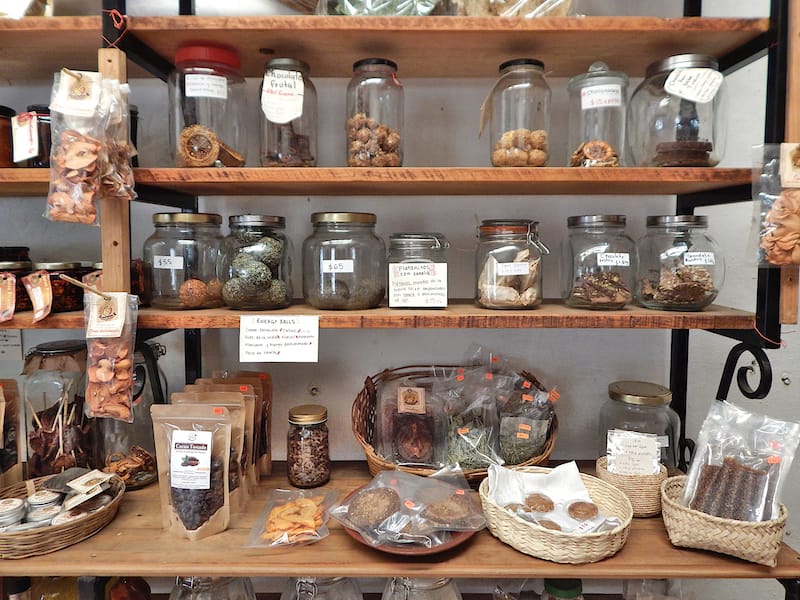
After closing her store in 2022 and taking some time off to refocus, Aguilero got back to work, selling her products at local markets as well as delivering directly to customers. One day, she wandered into Las Chiquihuitas to buy some organic ginger for her ginger beer, and felt the craving for a snack – but there weren’t any among the store’s selection of items. “Would you want to sell some of my products?” she remembers asking Ojeda. “We can’t do that, but you’re more than welcome to join us as a partner,” Ojeda replied. It was a quick and easy decision for Aguilero, who says she feels more relaxed in Chiquihuitas’ cooperative environment. “It’s helped me a lot. I’ve learned to collaborate, I’ve learned to listen – I’ve learned that I don’t always have to carry so much.”
As for the store’s all-female lineup, the partners agree that it creates a uniquely safe and supportive working environment. Jiménez, 48, notes that even though each woman is very busy and has her own life, business, and, in some cases, family to attend to, there’s a level of understanding between the partners that she attributes to the feminine energy at work in the store. “It’s really very special, because we all have different ways of seeing things, and we’re different people, but there’s so much respect, communication and understanding between us,” she shares. “If I were alone in this, I think I’d go crazy.”
 March 7, 2019 Take One Down and Pass It Around
March 7, 2019 Take One Down and Pass It Around
Many traditional bodegas in Barcelona are lined with bulk wine barrels, chalk marked […] Posted in Barcelona January 29, 2021 Building Blocks
January 29, 2021 Building Blocks
So ubiquitous as to be rendered almost invisible, the sticky bottles of soy sauce that […] Posted in Tokyo February 4, 2019 Taberna Sal Grosso
February 4, 2019 Taberna Sal Grosso
On a steep, narrow curve that winds up from Santa Apolonia station, a growing group of […] Posted in Lisbon
Lauren RothmanLauren Rothman
Published on June 28, 2024
Related stories
March 7, 2019
Barcelona | By Ian Walton
BarcelonaMany traditional bodegas in Barcelona are lined with bulk wine barrels, chalk marked with their content’s region of origin. But they also sell bottles of wine and other libations – vermut, draft beer and more. We get to sample these drinks, and the traditional Spanish foods that accompany them, at some of the city’s most…
January 29, 2021
Tokyo | By Lily Crossley-Baxter
TokyoSo ubiquitous as to be rendered almost invisible, the sticky bottles of soy sauce that decorate every table, counter and shelf in Japan are never far from reach. Both an ingredient and a condiment, there isn’t a chef in the land who would begrudge a diner a dash of the sleek black sauce – be…
February 4, 2019
LisbonOn a steep, narrow curve that winds up from Santa Apolonia station, a growing group of people waits. Whatever the weather, a small crowd will always be there, ready for the low doors to open at 8 p.m. Taberna Sal Grosso, which seats around 25 people, has been holding its own, quietly, for five years.…







































